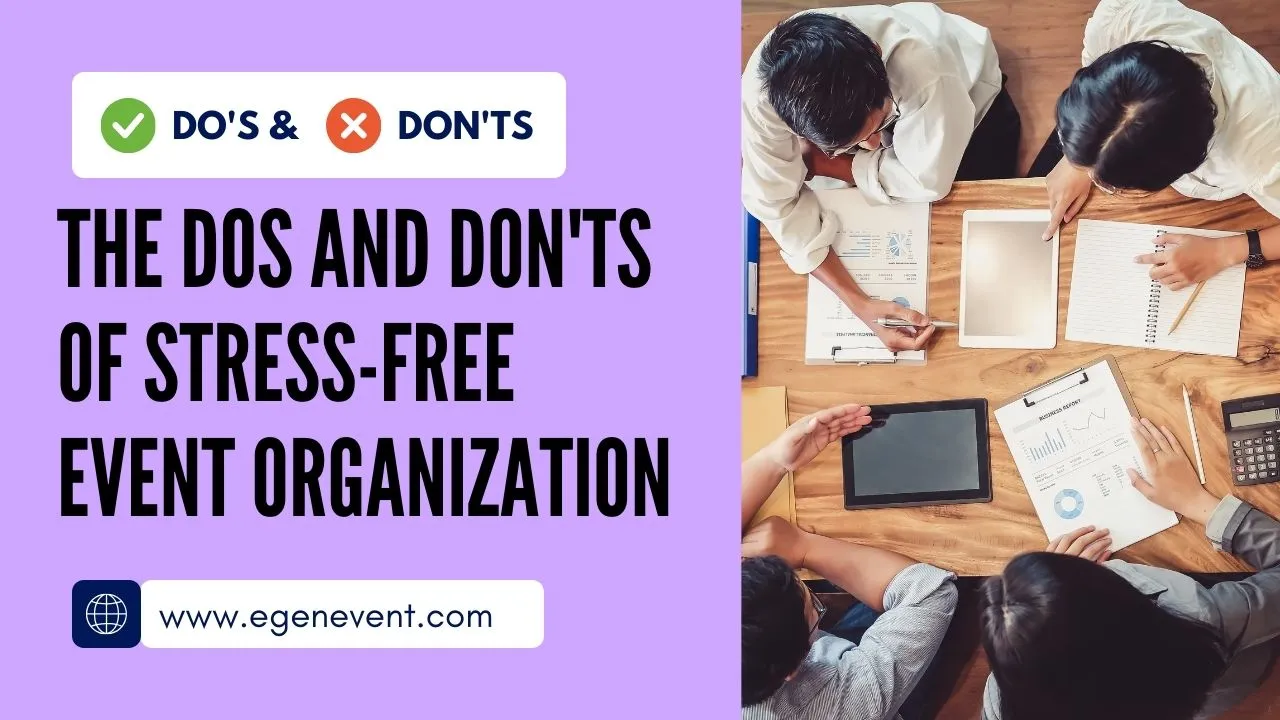Event planning, while exciting, can be a daunting task if not approached with careful consideration. To ensure a stress-free journey from concept to execution, follow these dos and don’ts that encapsulate the best practices of event management.

Dos:
Start Early and Plan Thoroughly:
Dos: Begin your event planning well in advance to allow ample time for every detail. Create a comprehensive timeline and checklist to keep yourself organized.
Understand Your Audience:
Dos: Tailor your event to the preferences and expectations of your target audience. A thorough understanding of who will be attending will guide your decisions on venue, activities, and overall theme.
Communication is Key:
Dos: Maintain open and clear communication with all stakeholders, including clients, vendors, and your event team. Regular updates and transparent communication help prevent misunderstandings.
Budget Wisely:
Dos: Develop a realistic budget and stick to it. Allocate funds wisely, prioritizing aspects that contribute most to the event’s success. Regularly review and adjust the budget as needed.
Utilize Event Technology:
Dos: Embrace event management tools and technology to streamline processes. Event apps, online registration systems, and project management platforms can significantly reduce administrative burdens.
Create Contingency Plans:
Dos: Anticipate potential challenges and develop contingency plans. From unexpected weather changes to technical issues, having backup plans in place ensures a smoother event execution.
Delegate Responsibilities:
Dos: Distribute tasks among a capable team. Delegating responsibilities not only lightens your load but also allows each team member to focus on their expertise, contributing to overall success.
Encourage Feedback:
Dos: Foster an environment where feedback is welcomed. Regularly check in with your team, vendors, and clients to address concerns promptly and make necessary adjustments.
Don’ts:
Procrastinate:
Don’ts: Avoid procrastination at all costs. Last-minute decisions and planning can lead to oversights and increased stress. Begin planning early to allow for thoughtful decision-making.
Overcomplicate:
Don’ts: Keep things simple and focused. Overcomplicating the planning process or the event itself can lead to confusion and unnecessary stress for both organizers and attendees.
Micromanage:
Don’ts: Resist the urge to micromanage every detail. Trust your team members and vendors to carry out their assigned tasks. Micromanaging can lead to burnout and hinder creativity.
Ignore Feedback:
Don’ts: Disregard feedback at your own peril. Ignoring input from team members, clients, or vendors may lead to missed opportunities for improvement and increased stress down the line.
Neglect Risk Assessment:
Don’ts: Fail to identify and assess potential risks. Ignoring the “what ifs” can leave you unprepared for emergencies, leading to stress and chaos during the event.
Overextend Your Budget:
Don’ts: Stray from your budget without careful consideration. Overextending financially can lead to stress as you scramble to cover unforeseen expenses.
Lack Flexibility:
Don’ts: Be inflexible in your approach. Events are dynamic, and unexpected changes will inevitably occur. Adaptability is crucial for stress-free event planning.
Underestimate Set-Up Time:
Don’ts: Allow insufficient time for set-up. Underestimating the time needed for preparation can lead to a rushed and chaotic start, creating unnecessary stress.
By incorporating these dos and don’ts into your event planning process, you pave the way for a stress-free and successful event execution. Remember, thoughtful preparation and a proactive mindset are the keys to turning your event vision into a seamless reality. Happy planning!

